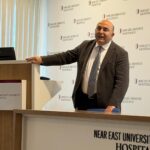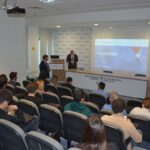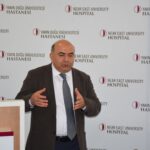
M. Mirat Satoğlu, Director of the TUBITAK ULAKBIM Institute, was a guest at this month’s “New Horizons: Science and Innovation Meetings” event series held at Near East University. The event addressed the contributions of open science to scientific production and the decisive role of digital infrastructures in the research world.
The “Open Science and Digital Infrastructures” seminar, held as part of the “New Horizons: Science and Innovation Meetings” event series carried out by the Near East University Center of Excellence and the Near East Research Innovation and Technology Area (NERITA), was well-attended.
The seminar aimed to raise awareness, particularly among academics, researchers, and students, about access to scientific data, data management, and the effective use of digital infrastructures. The seminar emphasized that open science accelerates scientific progress by increasing the transparency and shareability of research, and explored in detail the opportunities provided by digital technologies in academic studies. This month’s event series, coordinated by Prof. Dr. Murat Özgören, President of the Near East University Center of Excellence and the Near East Research Innovation and Technology Area (NERITA), featured a presentation titled “Open Science and Digital Infrastructures” by M. Mirat Satoğlu, President of TUBITAK ULAKBIM. The event, which was also attended by Prof. Dr. Umut Aksoy, Vice Rector of Near East University, was closely followed by deans and academics from various faculties of Near East University, as well as numerous graduate students. A focus group meeting held during the day as part of the event focused on the integration of open science into the local research ecosystem, data management policies, and the effective use of digital infrastructures. The meeting provided recommendations that served as a roadmap for future events in the series.

The contributions of open science to national and international scientific production were discussed!
Speakers at the first event held at Near East University included M. Mirat Satoğlu, Institute Director of the Scientific and Technological Research Council of Turkey (TUBITAK) National Academic Network and Information Center (ULAKBIM), spoke to participants about the contributions of open science to national and international scientific production. Satoğlu emphasized that digital infrastructures not only facilitate data sharing, but also strengthen collaboration among researchers and make scientific outputs more accessible.
In his presentation, Satoğlu highlighted the Ulakbim and Ulaknet infrastructures, Eduroam, EduGain, the TRUBA high-performance computing center, the Arf Center (CABIM), the Marenostrum Supercomputer, and the AI Factory initiatives. He also discussed the EKUAL, TRDizin, and DergiPark initiatives, as well as the Aperta and Harman Archives, and their importance both locally and globally. Satoğlu also noted that he closely examines Near East University’s academic and scientific index performance, saying, “We are very pleased to see such success coming from the TRNC.”

A strong foundation for interdisciplinary interaction!
Near East University Center of Excellence and NERITA President Prof. Dr. Murat Özgören stated in his opening remarks that the event series offers a significant opportunity to increase scientific collaborations and shift research culture to a more productive environment. Emphasizing the central role of open science in the contemporary research world, Prof. Dr. Özgören also stated that this is critical for visibility. Prof. Dr. Özgören noted that these gatherings will strengthen interdisciplinary interaction within the university and foster national and international partnerships. He added that by encouraging young researchers to participate more actively in scientific processes, they significantly contribute to the university’s innovative vision.


